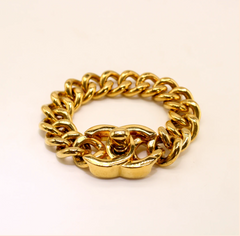Vintage Chanel Jewellery
Coco Chanel History
Coco Chanel has long been considered a fashion legend. Little black dresses, signature suits, collarless cardigans layered with pearls; brooches and cuffs along with the iconic quilted handbag were all essentials in her own life, and have become staples in the wardrobes of women all over the world.
Born 1883 in France by the name of Gabriel Bonhurst Chanel, her childhood was spent in poverty. When her mother died, her father abandoned her to an orphanage. Coco Chanel used fashion as her escape and her experiences in the orphanage informed many of the design elements she used in her clothing and jewellery. Eventually, she opened a tiny shop in Deauville selling simple, comfortable pieces that attracted the attention of wealthy women desperate to escape their corsets.
Chanel Jewellery
Coco Chanel adored accessories, and saw jewellery as necessary to seduction as perfume. We have Gabrielle Chanel's confident rebel spirit to thank for how we accessorise today. Her rule breaking ways, combining fine and costume jewellery were hugely controversial at the time. Coco Chanel revelled in combining high-end luxury with the what she called the "poor girl" look - a true high low style icon! She loved to confuse and cause controversy with her fashion choices.
Whilst her clothing was all about understated elegance, her taste for jewellery was very different. She loved opulent multifaceted designs, drawing inspiration from her Bohemian friends. She would pile on the necklaces and sautoirs, layering brooches and cuff bracelets - a look we see on the world's most fashionable people today.
Coco Chanel opened her jewellery workshop in 1924, working with collaborators such as Madame Gripoix, Francois Hugo and Fulco di Verdura, using an innovative combination of real and imitation materials. She was influenced by the bohemian and exotic, the Oriental and Egyptian. as well as the jewels of the Renaissance with their sumptuous gems and precious metal work.
Close friend and Sicilian nobleman Duke Fulco di Verdura, designed the iconic Maltese cross in 1927 which can still be seen on runways today. Coco Chanel had a long working relationship with jewellery designer Suzanne Gripoix, who created reproductions of Byzantine jewellery with special irregular glass pearls with a distinct mother-of-pearl sheen.
She considered costume jewellery to be the finishing touch for an outfit - cuff bracelets replaced the cuffs of a shirt, jewelled belts highlighted the waste, and brooches changed the way a dress fell.
In 1954, Coco Chanel staged a comeback with legendary goldsmith Robert Goosens where they crafted baroque designs and copies of pieces of costume jewellery she had been seen wearing for decades.
After Chanel's death in 1971, the House lumbered somewhat, and became seen as a little stuffy and formal. All that changed when Karl Lagerfeld joined as creative director in 1983, revolutionising the House of Chanel and the fashion industry forever. Chanel has Karl Lagerfeld to thank for it's mass appeal today.
The 80s and 90s were iconic eras for statement costume jewellery. With Victoire de Castellane at the helm, Chanel created big, bold pieces which were showcased by the world’s most famous supermodels.
Coco Chanel continues to be a fashion icon surrounded by myth and legend. Her rise from rags to riches and her sensational love affairs continue to inspire today. Chanel costume jewellery is as highly sought after today than ever. Vintage Chanel jewellery is a savvy investment for Chanel lovers everywhere. CC logo earrings, long chunky gold chanel chains layered with pearls and cuff bracelets have become an all year wardrobe staple for the fashion conscious.
Her understanding of women's needs and her forward thinking vision kept her at the top of Parisian haute couture for almost six decades. This incredible staying power demonstrates that Coco Chanel will always will be a legend, and the house of Chanel will forever have a place in our hearts.
Coco Chanel








